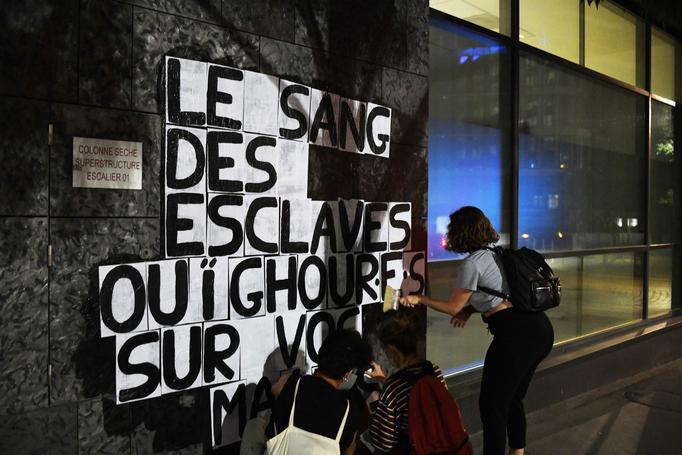Zara, Lacoste, Nike… the clothing giants attacked on the forced labor of the Uyghurs
The textile industry is struggling to show its credentials. Accused of using cotton from the forced labor of the Uyghurs in China, it had to sift through its supply chains, a challenge in the face of cascading subcontractors but a necessity in the face of increasingly watchful consumers. The stakes are enormous: 20% of the cotton used in the world is grown in China, mainly in the province of Xinjiang populated by Uyghurs, a Muslim minority repressed and exploited by Beijing according to human rights defenders, which the regime denies. Communist. "In the harvest season, workers arrive by train from other provinces. And within Xinjiang, there are also rural workers from all ethnic groups who pick cotton because they want to, because in a month they can earn more than 10,000 yuan (1,270 euros). Now picking is mostly mechanized so we don't need a large number of pickers," an official spokesperson for the province said last week. , to sweep the accusations.
But for the Washington-based NGO Uyghur Human Rights Project (UHRP), "the supply chains of most major clothing brands are tainted by Uyghur forced labor." She called on the textile industry to stop sourcing from Xinjiang, saying that while "big groups say they don't tolerate forced labor from their suppliers, they don't provide a credible explanation of how they fulfill this condition by continuing to do business in an area where forced labor is prevalent".
>> Read also – Uyghurs: faced with the “barbarism” of China, the United Kingdom is cracking down

The UK and Canada have decided to ban imports of goods suspected of being made from forced labour. For its part, the United States had taken restrictive measures in December concerning cotton imports from Xinjiang. In 2020, reports from NGOs and think tanks have followed one another to denounce the exploitation of Uyghurs in fields, workshops and factories supplying raw materials or finished products.
Gap, Nike, Adidas, Calvin Klein, H&M, Zara, Puma, Uniqlo, Ralph Lauren, Tommy Hilfiger, Abercrombie & Fitch, Uniqlo, Fila, Victoria's Secret and even Lacoste were notably accused, in March, by the NGO Australian Strategic Policy Institute of having obtained supplies "potentially directly or indirectly" - between 2017 and 2019 - from structures using Uyghur labor from "re-education camps". Some of these brands have never reacted, others have denied. Few have announced changes to their supply chain.
Tracing the origin of cotton
At the beginning of January 2021, the British Marks & Spencer - which uses 40,000 tons of cotton lint a year - has pledged not to use cotton from Xinjian. Adidas also told AFP that in 2019 it had "explicitly instructed its suppliers not to source yarn" in this province. Last September, H&M announced that it was ending all relations with a Chinese yarn producer denounced by the Australian NGO, and mentioned "an investigation in all the clothing factories with which it works in China". However, the Swedish giant acknowledged, in the context of a parliamentary committee in Great Britain, that "in view of the complexity of the supply chains, the work on the farm with the ginning (of cotton) and its spinning down to weaving and making, there is currently no solution available to fully trace the origin of cotton". Same observation for Gap, which underlines that as "a significant amount of the world's cotton is grown and spun in Xinjiang", it will make sure to "better understand how its global supply chain can be indirectly impacted".
>> Read also - China: US offensive on Uyghur “forced labor” cotton
Mastering each link in the production chain is "a heavy task which sometimes comes up against the difficulties of obtaining reliable information on the ground", said the CEO of Lacoste, Thierry Guibert, questioned by the left-wing MEP Raphaël Glucksmann, committed to the defense of the rights of the Uyghurs. The crocodile brand has pledged "to cease all activity with subcontractors who may be involved in the forced labor of Uyghurs" and tells AFP that it has carried out "337 social audits in 2019" to flush out "possible wrongdoers. ". On the part of a brand, "assuming that we don't know is already a big step. But as long as the principals delegate their responsibilities to the suppliers, we will not move forward", highlights Rym Trabelsi, co-founder of the independent application Clear Fashion which notes the commitments of brands.









